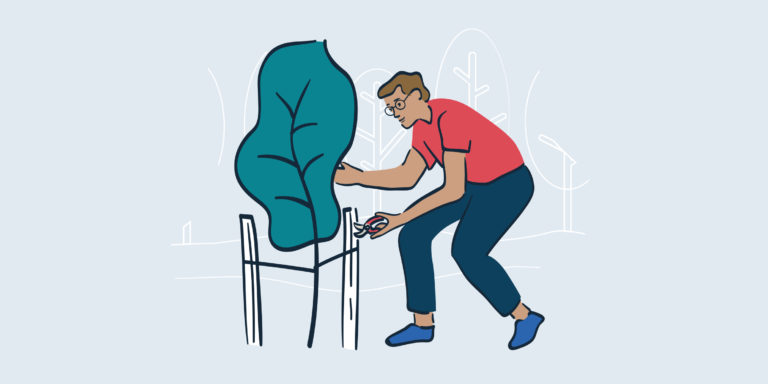Our Core Values, Episode III: Be Honest

This is the third in a series intended to go deeper on each of our core values, started with Our Core Values, Episode I: Be Excellent and followed by Episode II: Be Nice To People. This time around, we’ll talk about the core value of being honest.
Be Honest
We communicate openly and honestly with our coworkers and clients—believing that this leads to healthy relationships and work we can be proud of.
Honesty helps your team grow
Being honest can be difficult for me, especially when I’m afraid I might hurt someone’s feelings. I was recently asked to give peer feedback. The positive feedback was easy: “Yes, I definitely want to work on a project with her again. She’s accountable and dependable. She demonstrates excellent domain knowledge.” However, the constructive feedback was difficult—so hard I didn’t want to send it. I’m a tough grader and tend to be very honest. My manager knows me well and has quickly learned about my transparency. He once said to me, “You’re never at a loss for words.” Before sending my constructive peer review, I opened a chat session with Brad.
“I feel uncomfortable with this review,” I asked. “How’s it going to be communicated and used?”
We jumped on a video call and agreed honest feedback was important to my peers, Think Company, and ultimately our customers. So, I hit send.
Honestly leads to excellence
Honesty is powerful. It can detract and demotivate… even obliterate… but it can add great value when done right. Honesty is crucial in our business—it’s how we help our clients and peers succeed, and thus, how we succeed in return. You might be amazed at how often we say things, behind closed doors, like “We have to be ‘good consultants’ here and not say what they want to hear but what they need to hear… that’s the expectation when people hire us.”
Or, as my colleague Andrew so wisely put it, “If you can’t speak candidly and really get to the root of a problem, potentially excellent work suffers in mediocrity.”
In the first Think Session with a new client, we introduce our idea of a “Creative Partnership”—hinging upon the desire to give mutual, open and honest feedback. I explain, “Sometimes we’re going to push back, and other times we want you to push back. It’s got to be a two-way street for all of us to create and deliver outstanding results.” It’s a partnership, and at the foundation of any successful partnership is trust.
Constructive communication builds trust
If something is “constructive,” it means it’s something I can build on or a tool I can work with. Constructive communication is the difference between “I don’t like it,” and “that function is too critical to be hidden beneath the fold.”
Also, like a true partnership, communication must be a two-way street to really succeed. Timely, constructive, and useful feedback will always be tempered by the response of the recipient. From experience I can say that if my feedback is consistently received defensively, I’ll reflexively stop being so honest to avoid the unpleasantness.
It often takes a concerted effort and mutual agreement to establish and actively maintain that two-way street.
Trust requires empathy and time
We earn trust at Think Company by practicing empathy, vulnerability, and openness. We’re kind to each other (one of our other values), and that helps us build trust and honesty. We’re a good-hearted (and nerdy) community that really cares about the business and each other, which makes being honest a lot easier because we all know it’s in service of the greater good—and it’s something we signed up for when we became part of the team. Still, that doesn’t mean you can just flip a switch and magically have trust. I’ll never forget a colleague who once said to me, “I won’t just trust you. You have to earn it.” Trust takes time.
Some of our clients have been with Think Company since the day we opened as a user experience company, and continue to turn to us to help tackle new business challenges. In fact, in my two years here, the majority of my projects have been with recurring clients who feel more like friends and members of the extended team. Similarly, our employee turnover is abnormally low for our industry. Neither of these things happens by accident.
The recipe for honesty
When Russ asked me to write this post, I was in the midst of preparing for (an amazing) trip to Australia. I quickly emailed him back, “Sure, I love writing when I’m on vacation.” My phone rang a couple of minutes later.
“Were you serious?” he asked.
“Yes, seriously,” I said. “I actually love to write when I’m on a plane with few distractions.”
“OK, cool—because that sounded crazy sarcastic,” Russ responded. “Not that I would have blamed you!”
And that’s the way we roll. We have fun, but we’re also honest when we need to be. Russ picking up that phone to understand how I really felt and eliminate the guesswork—knowing he would be catching me at home in the midst of packing—and me answering it right away… it was all easy, because we’ve built trust over two years of working together and being honest with each other. It required little fanfare or setup—no mincing of words, and no follow-up afterward… we were on to bigger and better things.
The more time I spent thinking about this post, the more I thought it would be so boring and obvious. I wondered who would want to read it. But you know what? I changed my mind because honesty is important to my colleagues, my clients, and myself. It’s a stated core value at Think Company, we check ourselves against it, and I love that. It’s a big reason why I love what I do, and I know it contributes to my success doing it. When my partner asks me “How was your day?” most days I can honestly say, “It was awesome.” Again, that doesn’t happen by accident.



